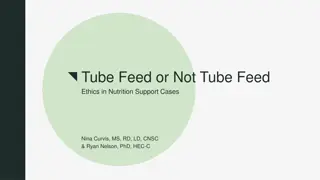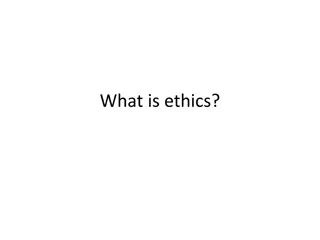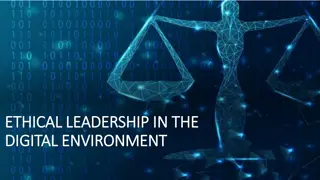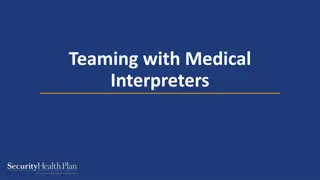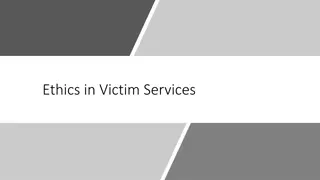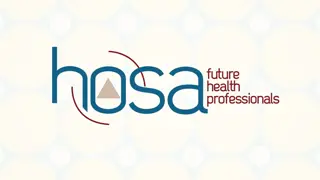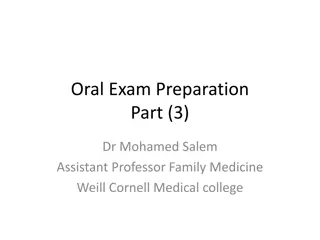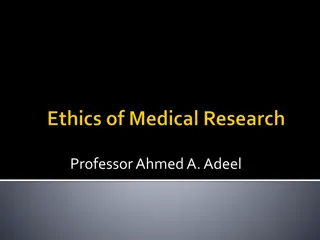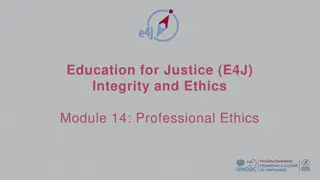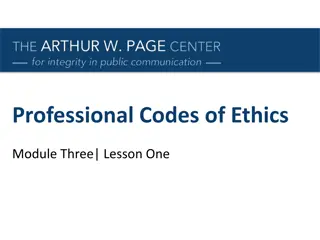Understanding Medical Ethics: Principles and Importance
Ethics in medicine is vital for guiding healthcare professionals in their interactions with patients, colleagues, and society. It encompasses moral values, legal responsibilities, and principles such as non-malfeasance, beneficence, autonomy, and justice. Ignorance of medical ethics can lead to negligent behavior and legal consequences, highlighting the significance of ethical awareness in the practice of medicine.
Download Presentation

Please find below an Image/Link to download the presentation.
The content on the website is provided AS IS for your information and personal use only. It may not be sold, licensed, or shared on other websites without obtaining consent from the author. Download presentation by click this link. If you encounter any issues during the download, it is possible that the publisher has removed the file from their server.
E N D
Presentation Transcript
Dr. Chandresh Tailor Asst. Prof. FMT, GMC,Surat
Introduction Ethics is a scienceof moral valuesor principles. Medical Ethics is moral principles which should guide the members of medical profession in their dealing with the patients, their relatives, community, and with colleagues in profession. The principle objective of medical profession is to render service to humanity with full respect for dignity of human beings. Every doctor whatever his or her specialty, has to discharge medicolegal responsibilities and to solve medicolegal problems from the 1stday of his or her practice. Everything a doctor does in a practice of medicine is governed by legal system.
Why study of ethics is essential? Ignorance about medical law & ethics by young medicos leads to consequence of negligent behavior, failure to discharge compulsory duties towards the patient & state, amounting to infamousconductor negligentcharges. Members of general public are increasingly aware of their rights due from a doctor, questioning the legality of issues. Doctors should also know who are the authorities proposing these rules and what penalties one is likely to be punished with in the eventof breach of them.
Medical Ethics The word ethics= Greek term ethikos = rules of conduct that govern natural disposition in human beings. Deals with moral principles which should guide member of the medical profession in their dealing with each other, their patients and the state. The word Moral= Latin term mores concerning with Goodness or Badnessof a human characteror behavior. Moral = sexual or social behavior and Ethics= professional behavior. The contemporary construction of formulated in United States in 1970 by statementof 4 principles: BIOETHICS was first well contd
1. Non-malfeasance {duty to Endeavour todo no harm} 2. Beneficence { duty todo good, be caring, etc.} 3. Respect to autonomy { duty to respect the human dignity, freedom and free choice of the individual and more importantly, to facilitate in every reasonably possible manner to the making of such a free choice } and 4. Natural and distributive justice {ensuring equal share in the distribution of health care ( Equality) and priority to be given to those who are in need, in proportion to their need} Medical Etiquette Deals with conventional law of courtesy observed between members of the medical profession. A doctor should behave with his colleagues as he would have them behave with himself.
Origin of Medical Ethics Firstly it is describe by CHARAKA s Oath in 7thcentury BC then Arthashastraof KAUTILYA in 3rd-5thcentury BC SUSHRUTA which composed SUSHRUTA SAMHITA (200-300 AD) MEDICAL COUNCIL Of INDIA ( founded in 1933) formulates the modern code of medical law and ethics in India
The Indian Medical Council The act of 1933 was repealed and the act of 1956 was passed. The medical council consist of following member. One member from each state nominated by central govt. in consult with state govt. concerned. One member from each university elected from among member of medical faculty of university, by member of the senate or the member of court of university. One member of each state in which state medical register maintained. Seven member elected from among themselves by person enrolled on any of the State Medical Registers. Eight members nominated by central govt. 1. 2. 3. 4. 5.
Hold office for 5 yrs. A president and vice-president are elected from among these members. Council also appoint a Registrar who act as secretary & may also act as treasurer, who look afterday to daywork. Executive committee consist of president, vice president and 7 to 10 members. The 1st schedule of act contained recognized medical qualification granted by universities in India. The 2ndschedule those granted outside India. Part 1 of 3rdschedule contained those granted by medical institutions not included in 1stschedule. Part 2 of 3rdschedule those granted outside india but not included in 2ndschedule.
Functions of Indian Medical Council Medical Register Maintained medical practitioners register known as Indian medical Register. Contained nameof all person enrolled in State Medical Reg. If name of person removed from State Medical Reg. then it also removed from Indian Medical Register. 1. Medical Education It prescribe standard of postgraduate medical education forguidance of the universities. Advice univ. to maintained uniform standard for PG medical Education throughout India. A PG Committeeconsistof 9 members. Prior approval of IMC necessary beforestarting PG course. If mandatory regulation is not followed, thequalification will not be recognized by IMC. 2.
The council appoints Medical Inspector to attend at any or all examination held by univ. Institution in India for purpose of recommend to central govt, Qualification. The inspector has no power to interferewith examination. The inspector report to the council on the adequacy of standard of medical education including Accommodation, Training, Other facilities prescribed for giving Med. Education. The council forward copyof report to medical institute/ univ. The copywith remark of univ. sent to thecentral govt. If council is not satisfied with standard, it can make a representation to the central govt. to withdraw recognition of medical qualification of any univ. After considering , central govt. may send it to the concerned state govt. forsubmitting an explanation. recognition of medical Staff, Equipment,
Recognition of Foreign Medical Qualification If Indian national obtains a foreign qualification which is not included in part 2 of 3rdschedule, he can apply to the Central Govt. The candidate has to provide full information regarding course of study, syllabus, duration of the course, etc. This is forwarded to IMC which has authority to enter into negotiation with any of the Medical Council of the Foreign Authority and can recognize such foreign qualification on reciprocal basis. The central govt may by notification in Official Gazette, amend the part 2 of 3rdschedule so as to include such qualification therein. 4. Appeal Against Disciplinary Action If the name of any person is removed from the State Medical Register, he may appeal to the Central Govt, after exhausting all remedies in State Medical Council Act. 5. Recommend Central Govt for amendment, change or introduction of new rules & regulation for teaching, modalities in teaching, training, examinations, and services in teaching & training insti. 3.
5. Warning Notice The council may prescribe Standard of professional conduct and etiquette and code of ethics for medical practitioners. It can issue Warning Notice containing certain practices which are regarded as falling within the meaning term, Serious Professional Misconduct.
State Medical Council Medical teachers from different universities of the State elected by the teachers of the different medical institution. Consist of members elected by the registered medical practitioners . Some members nominated by the State Governments.
Functions of State Medical Council 1. Medical Register It appoints a Registrar, keeps Register of medical practitioners. Any person having any recognized medical qualification can get his or her nameentered. The name, residence, qualification and the date on which each qualification was granted of every person who is registered under this act are entered in the Register on payment of prescribed fees. After passing the qualifying examination it is necessary to undergo a period qualification was granted to him. First provisional registration is given so they can practice medicine in approved institution for the required period. of training, before
2. Disciplinary Control They have power to remove the names of medical practitioner permanently or for a specific period due to Serious Professional Misconduct. Also authorized for restoration removed. 3. Warning Notice Also issue warning notice similar to IMC of name so
Erasure of Name The name of doctor is removed from the Medical Register: 1. Afterthe death of the registered practitioner. 2. Entrywhich are made in errororas a result of fraud. 3. Penal Erasure. Due to Serious Professional doctor is removed from Medical Register for temporary or permanent period. when name of doctor is removed from Medical Register permanently then it is known as The Professional Death Sentence . It deprives the practitioner of all the privilege of a registered practitioner. Serious Professional Misconduct ( Infamous Conduct) Any conduct of a doctor which might reasonably be regarded as disgraceful or dishonorable. It involves an abuse of professional position. Misconduct the name of
Warning Notice Warning Notice
Warning Notice If any one is found guilty of any of the following mentioned in the warning notice issued by Medical Council of India, his namecan be removed from the Medical Register. Adultery Improperconduct with the patientorwith memberof pt. family. Conviction by court of law foroffence involving moral turpitude. 4. Issuing a false certificate in connection with sick benefit, insurance, passport, attendance in court, public service, etc. Withholding informationof notifiabledisease to health authority. 6. Performing orenabling unqualified person to perform abortion. Prescribing steroids/psychotropic drugs when no indication. 8. Not displaying the registration no. given to him in clinic, prescription and certificate etc. issued by him. 9. Dichotomy or fee splitting.( receiving orgiving commission) 10. Using of touts oragents forprocuring patients. offences 1. 2. 3. 5. 7. Contd
11. Disclosing secrets of the patient. 12. Covering, i.e. assisting someone who has no medical qualification to attend, treator performan operation on some person. 13. Write prescription in private formulae of which only he or a pharmacy has a key. 14. Advertising 15. Running an open shop for sale of medicines, for dispensing prescription of otherdoctors. 16. Drunk and disorderly so interferewith properskilled practice. 17. Having involvement in physical or mental torture to otherperson 18. Doing sex determination test. 19. Failure to obtain consent of both husband and wife in an operation which may result in sterility. 20. Failure to obtain consent of the female pt.,her husband and donor in actof in vitro fertilization. 21. Violation of ICMR guidelines.
Professional Misconduct -- ADVERTISING Doctor s name plate, signboard(large) with consultancy rates, lab test rate, medicine rates displayed in heart of city area Notification in Lay Press
Professional Misconduct Canvassing: Use of touts or agents for procuring patients Supplying or selling drugs of Addiction
Professional Misconduct Attending patient while on Alcohol Seducing a female Patient
Professional Misconduct Issuing a False Certificate Dichotomy
Professional Misconduct Talking Disparaginingly of a Colleague
Hippocratic Oath The modernised version of the Hippocratic oath are the Declaration of Geneva, as adopted by the 3rd General Assembly of World Medical Association at Geneva, Switzerland, in September,1948, (amended in 1983), and the International Code of Medical Ethics, as adopted by the General Assembly of the World Medical Association held in London , in October, 1948.
The Declaration of Geneva At the time of Registration, each applicant shall be given a copy of the following declaration by the Registrar concerned an d the applicant shall read and agree to abide by the same. I solemnly pledge myself to consecrate my life to the service of Humanity. I will maintain the utmost respect for human life from the time of conception. Even under threat, I will not use my medical knowledge contrary to the law of humanity. I will not permit consideration of religion, nationality, race, party politics or social standing to intervene between my duty and my patient. 1. 2. 3.
4. I will practice my profession with conscience and dignity. 5. The health of my patient consideration. 6. I will respect the secrets which are confided in me. 7. I will give to my teachers the respect and gratitude which is their due. 8. I will maintain by all the means in my power, the honour and noble traditions of the medical profession. 9. I will treat my colleagues with all respect and dignity. 10. I shall abide by the Code of Medical ethics as enumerated in the Indian Medical Council Regulation, 2002. I make these promises solemnly, freely and upon my honour. will be my first






